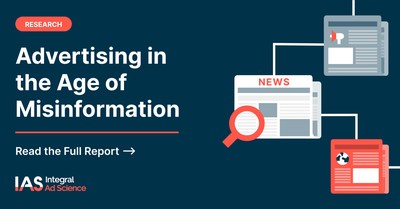New IAS Report Uncovers How Consumer Perception of Misleading Content Impacts Brand Favorability
Rhea-AI Summary
Integral Ad Science (Nasdaq: IAS) released a new report titled "Advertising in the Age of Misinformation," examining how misleading content affects brand reputation. The survey of over 1,150 adults revealed that 71% encounter misleading digital content frequently, with 65% likely to stop buying from brands advertising near such misinformation. Furthermore, 42% of media experts express concern about reputation risks when ads appear next to misleading content. The research underlines the importance of context-based advertising strategies to mitigate these risks and maximize ROI.
Positive
- The report highlights the significant consumer concern over misleading content, providing an opportunity for brands to enhance their reputation by avoiding association with such content.
- Consumers are likely to favor brands that actively denounce misinformation, indicating potential for positive consumer perception.
Negative
- 65% of consumers may cease purchasing from brands that advertise next to misinformation, posing a risk to sales.
- 42% of media experts are worried about reputational damage from ads adjacent to misleading content, which could lead to increased advertiser caution.
News Market Reaction 1 Alert
On the day this news was published, IAS gained 4.75%, reflecting a moderate positive market reaction.
Data tracked by StockTitan Argus on the day of publication.
New research demonstrates the impact of misleading content to a company's reputation
NEW YORK, Sept. 7, 2022 /PRNewswire/ -- Integral Ad Science (Nasdaq: IAS), a global leader in digital media quality, today released its "Advertising in the Age of Misinformation" report that uncovers how consumer perception of misleading content impacts brand favorability. This follows the "Misinformation & Media Quality" report released in June that explores what actions advertisers are taking to protect their campaigns against these growing threats.
Today's report on consumer perception explores the challenges that misinformation poses for media strategies, as well as how consumers' perceptions of misinformation affects brand sentiment, in turn influencing the way they interact with brands.
The majority of the survey participants echoed that misinformation is a serious issue in digital media and consider many different types of content under misinformation such as: misleading content, fabricated content, manipulated content, false content, false connection, imposter content, propaganda, satire or parody.
IAS surveyed over 1,150 adults to examine how they perceive and interact with misinformation in digital environments, revealing consumers' expectations for brands whose ads appear adjacent to misleading content.
The research revealed the following trends:
- Digital media consumption is high among consumers, which increases the chance of encountering misinformation: The majority of consumers surveyed said that social media is the content type they consume the most, with
71% of them regularly encountering misleading digital content.73% of consumers check digital media several times a day on their smart devices. - Consumers view misinformation as a major problem, and are confident in their ability to detect misinformation online: While the majority of consumers believe misinformation is a serious issue in digital media,
91% of consumers are confident in their ability to detect misinformation. While consumer confidence is high, misinformation is not always simple to detect, increasing risk for brands. - Consumers feel unfavorably toward brands whose ads appear alongside misinformation, impacting future purchase decisions: An alarming observation was that
65% of consumers say that they are likely or very likely to stop buying from a brand that advertises next to misinformation.73% of consumers agree or strongly agree that they would feel unfavorably towards brands that have been associated with misinformation. However, consumers are also likely to take action and remember when a brand's ads appear near misinformation and will perceive a brand more positively if it actively denounces misinformation.
"Our research demonstrates that there's a gap between consumers' unfavorable views of content alongside misinformation and how prepared marketers are to address it," said Yannis Dosios, Global Chief Commercial Officer (CCO) at IAS. "Context-based strategies provide an incredible opportunity for marketers to avoid misinformation and reach their target audience for maximum ROI with minimal impact on reach."
About Integral Ad Science
Integral Ad Science (IAS) is a global leader in digital media quality. IAS makes every impression count, ensuring that ads are viewable by real people, in safe and suitable environments, activating contextual targeting, and driving supply path optimization.
Our mission is to be the global benchmark for trust and transparency in digital media quality for the world's leading brands, publishers, and platforms. We do this through data-driven technologies with actionable real-time signals and insight. Founded in 2009 and headquartered in New York, IAS works with thousands of top advertisers and premium publishers worldwide. For more information, visit integralads.com.
Media Contact
Press@integralads.com
![]() View original content to download multimedia:https://www.prnewswire.com/news-releases/new-ias-report-uncovers-how-consumer-perception-of-misleading-content-impacts-brand-favorability-301619037.html
View original content to download multimedia:https://www.prnewswire.com/news-releases/new-ias-report-uncovers-how-consumer-perception-of-misleading-content-impacts-brand-favorability-301619037.html
SOURCE Integral Ad Science, Inc.










